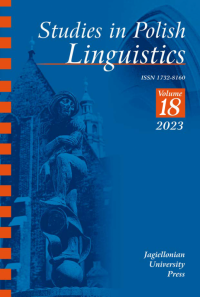A Typology of Stranded Phonologically Weak Elements
A Typology of Stranded Phonologically Weak Elements
Author(s): Željko BoškovićSubject(s): Phonetics / Phonology
Published by: Wydawnictwo Uniwersytetu Jagiellońskiego
Keywords: clitics; particle-stranding ellipsis; prosodic phrasing; preposition stranding;
Summary/Abstract: The paper presents a unified account of a number of superficially very different cases from Japanese, Serbo-Croatian, German, and Dutch where a phonologically weak element is stranded without a host. It proposes a new typology regarding when a phonologically weak element can be stranded where adjacency to a prosodic boundary is necessary for such stranding, with parametrization regarding the strength of the prosodic boundary: it can be an utterance boundary (║) or an intonational-phrase boundary (#), or either║or # (in the last case, both boundaries can license the stranding). Furthermore, the difference in the direction of adjacency to the prosodic boundary mirrors the difference in the adjacency to the host: if the relevant element is a prefix/proclitic, both the host and the prosodic boundary follow it, if it is an enclitic/suffix, they both precede it.
Journal: Studies in Polish Linguistics
- Issue Year: 18/2023
- Issue No: 3
- Page Range: 85-95
- Page Count: 11
- Language: English

